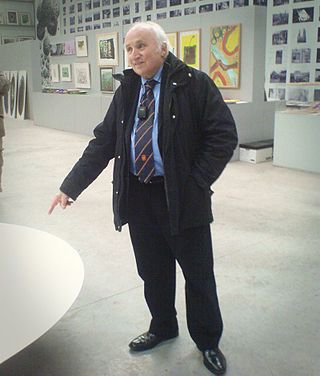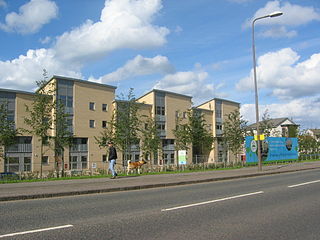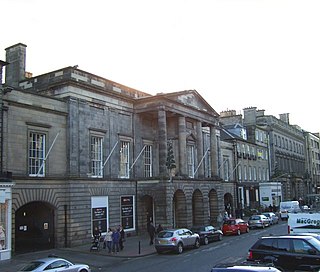Related Research Articles

Edinburgh is the capital city of Scotland and one of its 32 council areas. The city is located in south-east Scotland, and is bounded to the north by the Firth of Forth estuary and to the south by the Pentland Hills. Edinburgh had a population of 506,520 in mid-2020, making it the second-most populous city in Scotland and the seventh-most populous in the United Kingdom.

Scotland is a country that is part of the United Kingdom. It contains nearly one-third of the United Kingdom's land area, consisting of the northern part of the island of Great Britain and more than 790 adjacent islands, principally in the archipelagos of the Hebrides and the Northern Isles. To the south-east, Scotland has its only land border, which is 96 miles (154 km) long and shared with England; the country is surrounded by the Atlantic Ocean to the north and west, the North Sea to the north-east and east, and the Irish Sea to the south. The population in 2022 was 5,436,600 and accounts for 8% of the population of the UK. Edinburgh is the capital and Glasgow is the largest of the cities of Scotland.

Glasgow is the most populous city in Scotland, the third-most populous city in the United Kingdom, and the 27th-most populous city in Europe. In 2022, it had an estimated population as a defined locality of 632,350 and anchored an urban settlement of 1,028,220. Formed as a county of itself in 1893, the city had previously been in the historic county of Lanarkshire and has also grown to include settlements that were once part of Renfrewshire and Dunbartonshire. It now forms the Glasgow City Council area, one of the 32 council areas of Scotland, and is administered by Glasgow City Council.

(James) Hamish Scott Henderson was a Scottish poet, songwriter, communist, intellectual and soldier. He was a catalyst for the folk revival in Scotland. He was also an accomplished folk song collector and discovered such notable performers as Jeannie Robertson, Flora MacNeil and Calum Johnston. Born in Blairgowrie, Perthshire on the first Armistice Day 11 November 1919, to a single mother, Janet Henderson, a Queen's Nurse who had served in France, and was then working in the war hospital at Blair Castle. His name was recorded at registration as James but he preferred the Scots form Hamish.

Edinburgh Trams is a tramway in Edinburgh, Scotland, operated by Edinburgh Trams Ltd. It is an 18.5-kilometre (11.5 mi) line between Newhaven and Edinburgh Airport, with 23 stops.

The Edinburgh International Book Festival (EIBF) is a book festival that takes place in the last three weeks of August every year in Charlotte Square in the centre of Scotland's capital city, Edinburgh. Billed as The largest festival of its kind in the world, the festival hosts a concentrated flurry of cultural and political talks and debates, along with its well-established children's events programme.

Richard Demarco CBE is a Scottish artist and promoter of the visual and performing arts.

This article is a timeline of the history of Edinburgh, Scotland, up to the present day. It traces its rise from an early hill fort and later royal residence to the bustling city and capital of Scotland that it is today.
St. Augustine's High School, established in 1969, is a Roman Catholic secondary school serving the west of Edinburgh, Scotland, with approximately 840 pupils.

Niddrie is a residential suburb in Edinburgh, Scotland. It is situated in the south-east of the city, south-west of the seaside area of Portobello, and west of Musselburgh in East Lothian near Fort Kinnaird retail park. The western section of Niddrie is also known by the alternative name of Craigmillar.

Underbelly is a live events producer and venue operator, known as one of the "Big Four" venue operators at the Edinburgh Festival Fringe. From its roots as a Fringe venue, the company has expanded to include a festival on London's South Bank and seasonal events in Edinburgh and elsewhere.

HMP Edinburgh is located in the west of Edinburgh on the main A71, in an area now known as Stenhouse, and, although never named as such, has commonly been known as Saughton Prison from the old name for the general area. The prison is situated on the edge of a predominantly residential area and has good transport and road links to the city centre, which provides good access both for local courts and prison visitors. The building of the prison began on 31 July 1914 with the first prisoner being received in 1919. The prison consists of four halls: Glenesk, Hermiston, Ingliston and Ratho.
Events from the year 2006 in Scotland.
Alexander Boyd FRSA is a Scottish photographer and writer. He has published several books, and his work is included in both public and private collections including the Scottish National Portrait Gallery, The Yale Center for British Art, and the Royal Photographic Society collection held at the V&A.

The 2007 Scottish Parliament election was held on Thursday 3 May 2007 to elect members to the Scottish Parliament. It was the third general election to the devolved Scottish Parliament since it was created in 1999. Local elections in Scotland fell on the same day.
Kenyon Edward Canon Wright was a priest of the Scottish Episcopal Church and a political campaigner. Wright chaired the Scottish Constitutional Convention (1989–1999), which laid the groundwork for the creation of the devolved Scottish Parliament in 1999.

The Assembly Rooms are meeting halls in central Edinburgh, Scotland. Originally solely a meeting place for social gatherings, it is now also used as an arts venue and for public events, including the Edinburgh Festival Fringe and the Hogmanay celebrations. There are four rooms, with moveable chairs or tables, that are used year-round and are available for private functions: Music Hall, Ballroom, Supper Room and Edinburgh Suite.
Flora MacNeil, MBE was a Scottish Gaelic Traditional singer. MacNeil gained prominence after meeting Alan Lomax and Hamish Henderson during the early 1950s, and continued to perform into her later years.
Events from the year 2002 in Scotland.

The Scottish book sculptures are a group of book sculptures that were contrived to be "found" in Scotland between 2011 and 2016. The sculptures are on topics mostly concerning Scottish literature and poetry, and are made out of old books by an anonymous female paper sculptor.
References
- ↑ "Cheap thrills at festivals". BBC News. 10 August 2003. Retrieved 12 January 2016.
- ↑ "'People's Festival' line-up revealed". BBC News. 29 July 2003. Retrieved 12 January 2016.
- ↑ "Curtain up on Edinburgh People's Festival". The Scotsman . 10 July 2008. Retrieved 13 January 2016.
- ↑ "Rankin gets write idea to please fans at festival for all". Edinburgh Evening News. 4 August 2007. Retrieved 13 January 2016.